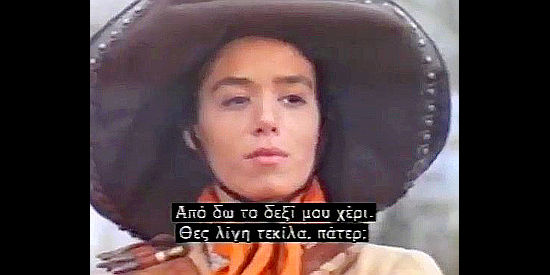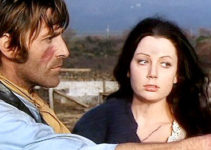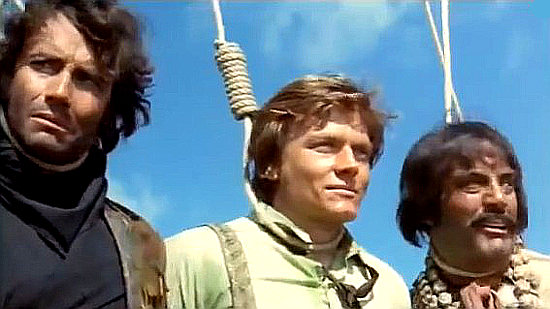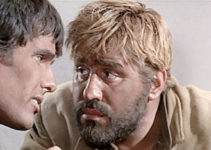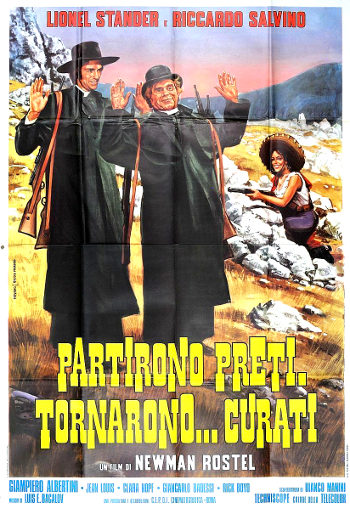 Lionel Stander is Sam Thompson and Riccardo Salvino is John the Timid, two con men roaming the West posing as priests.
Lionel Stander is Sam Thompson and Riccardo Salvino is John the Timid, two con men roaming the West posing as priests.
Bounty hunters have just cornered them when Gen. Miguel (Giampiero Albertini) and his Mexican revolutionaries happen by.
Believing a priest is good luck — and two will double that luck — Miguel saves Sam and John and encourages them to ride along with his men.
John’s all for that. After all, he’s sneaked a peek at Miguel’s chief lieutenant Adelita (Clara Hopf) while she was bathing. And she’s a virgin in spite of those tantalizing curves.
But then Miguel mentions a $500,000 gold shipment the regular army is transferring by train from Texicola to Vera Cruz.
Even if the Bible is on their tongues, there’s larcenary in their hearts. So Sam and John sneak off in the middle of the night, intent on making that gold theirs.
Along the way, they insult a Mexican landowner named Don Felipe, deliver a baby and nearly wind up in front of a firing squad before reuniting with Miguel and his revolutionaries.
But Adelita delivers some discouraging news. The gold, previously hidden in a coffin, has been discovered and whisked off to the governor’s private safe.
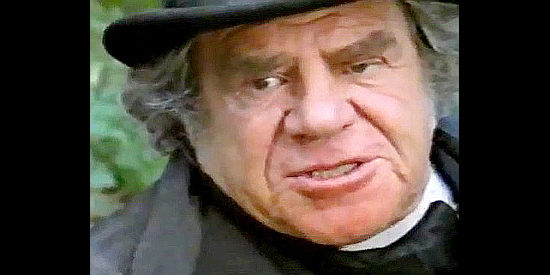
Lionel Stander as Sam warning John to keep his hands off the virgin revolutionary in Hallelujah to Vera Cruz (1973)
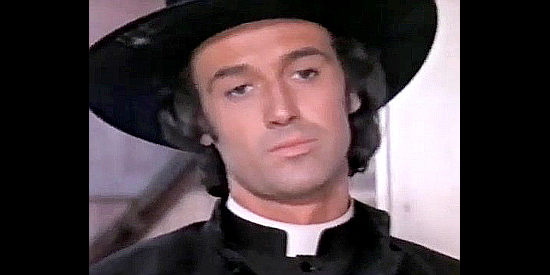
Riccardo Salvino as John the Timid, proving he’s not all that timid in the company of ruffians in Hallelujah to Vera Cruz (1973)
Another in the massive wave of Spaghetti comedies that followed the success of Terence Hill’s “They Call Me Trinity,” but lacking the original tone and humor in that film.
Oh, there’s a chuckle or two. At one point, Sam winds up pretending to be the statue of a saint. At another, John winds up dressing in drag to charm his way into the govenor’s private quarters.
But it’s mostly low-brow humor. The aforementioned baby? The dad asks if it’s a boy or girl, at which point it sprays Sam’s face with urine, answering the question.
Then there’s the scene in which the Mexican regulars check our heroes for weapons. They reach into Sam’s longjohns and find a “small gun.”
One other complaint: There’s not nearly enough of Clara Hopf as Adelita since the bandit gang disappears for a large portion of the film.
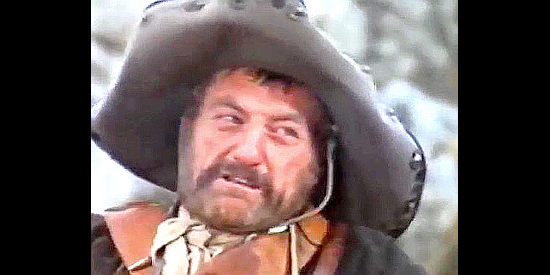
Giampiero Albertini as Gen. Miguel, the one-handed revolutionary leader who thinks priests are good luck in Hallelujah to Vera Cruz (1973)
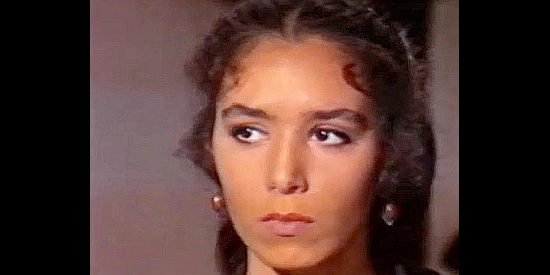
Clara Hopf as Adelita, the pretty female revolutionary who catches John’s eye in Hallelujah to Vera Cru (1973)
Directed by:
Bianco Manini
as Newman Rostel
Cast:
Lionel Stander … Sam “Tonaca” Thompson
Riccardo Salvino … John the Timid
Giampiero Albertini … Gen. Miguel
Jean Louis … Don Felipe
Clara Hopf … Adelita
Camillo Milli … Monastery abbot
Giancarlo Badessi … Governor
Federico Boido …. Miguel bandit
as Rick Boyd
Spartaco Conversi … Miguel bandit
Srgio Serafini … Miguel bandit
Tom Felleghy … Mexican officer
Also with: Flavio Colombaioni, Luigi Antonio Guerra, Mario Dardinelli, Aldo Sambrell, Angelo Boscariol, Franz Colangeli, Alba Maiolini, Osiride Pevarello, Francesca Milizia, Stefano Patrizi, Renato Salvini, Anita Strindberg, Alvaro Vitali, Carla Mancini
Runtime: 102 min.
aka:
Partirono preti, tornarono… curati
Music: Luis Bacalov
Song: “Blue Eggs and Ham”
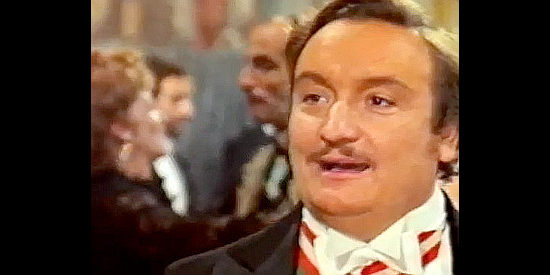
Giancarlo Badessi as the governor, catching his first glimpse of John as a woman in Hallelujah to Vera Cruz (1973)
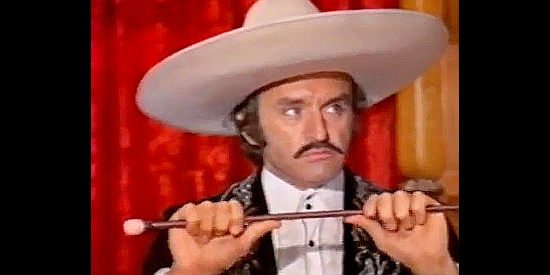
Jean Louis as Don Felipe, the landowner who doesn’t approve of priests in Hallelujah to Vera Cruz (1973)
Memorable lines:
Conseula, the desk clerk at hotel: “The owner of this hotel is Don Felipe. The priest defends the peons, the peons don’t work the land, and Don Felipe owns lots of land. That’s why he hates priests.”
John the Timid: “If he only worries about peons, I don’t give a damn about them. What I need is a room. And a bale of hay for my horse, naturally.”
Mexican officer, after one of his men fishes a gun out of Sam’s longjohns: “And what is this? Some new blessing?”
Sam: “But its so small.”
Miguel, about a tradition that the leader of the next attack sit on a plate of hot coals while pledging loyalty to the revolution: “Your mouth can be lying, but your ass? Never!”
Sam, as he’s being tied to the railroad tracks: “But are you sure this is a good device to sto the train?”
John: “Now, don’t worry about that Sam. No Mexican train driver would ever run over a priest.”
Sam: “What if he’s not religious?”
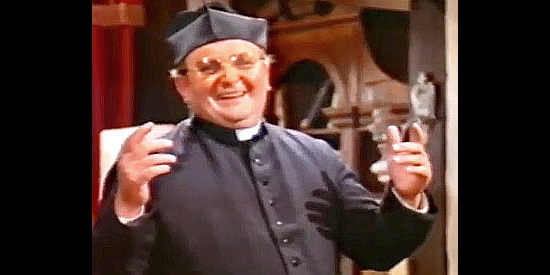
Camillo Milli as the abbot at the monastery, concerned about a lost statue in Hallelujah to Vera Cruz (1973)
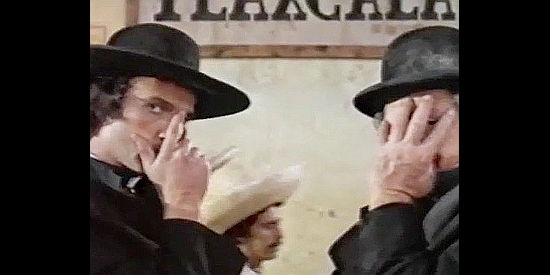
Riccardo Salvino as John and Lionel Stander as Sam spy on a train filled with gold while trying to hide their ungodly intent in Hallelujah to Vera Cruz (1973)
Trivia:
This marked one of only two credited roles for Clara Hopf. Her other came as the title character in “Apache Woman.” Who can forget that poster? She also appears briefly in 1973’s “The Executioner of God” as Donald O’Brien’s new whore.
This appears to be the only directing effort for Bianco Manini, though he produced a couple of fine serious Westerns — “A Bullet for the General” (1967) and “The Price of Power” (1969) and a much funnier comedy Western “A Train for Durango” (1968).
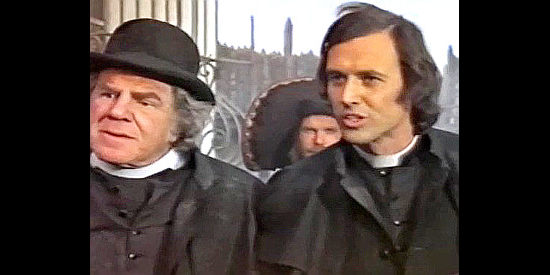
Lionel Stander as Sam Thompson and Riccardo Salvino as John learn about a planned attack on a train loaded with gold in Hallelujah to Vera Cruz (1973)
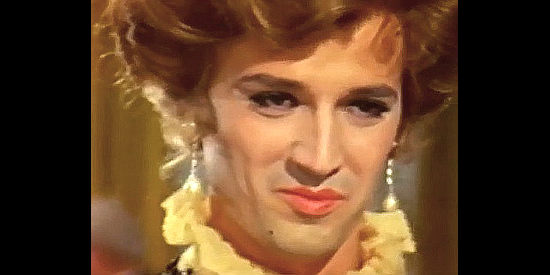
Riccardo Salvino as John the Timid, goes all out as a woman to get to the gold in Hallelujah to Santa Cruz (1973)
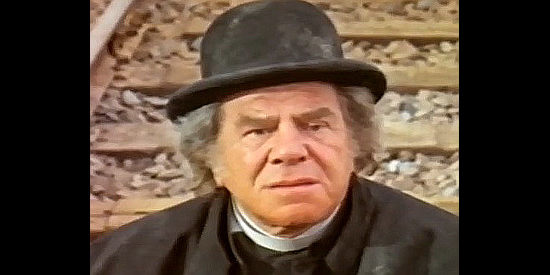
Lionel Stander as Sam, tied to the tracks and hoping the train engineer is a Godly man in Hallelujah at Vera Cruz (1973)

